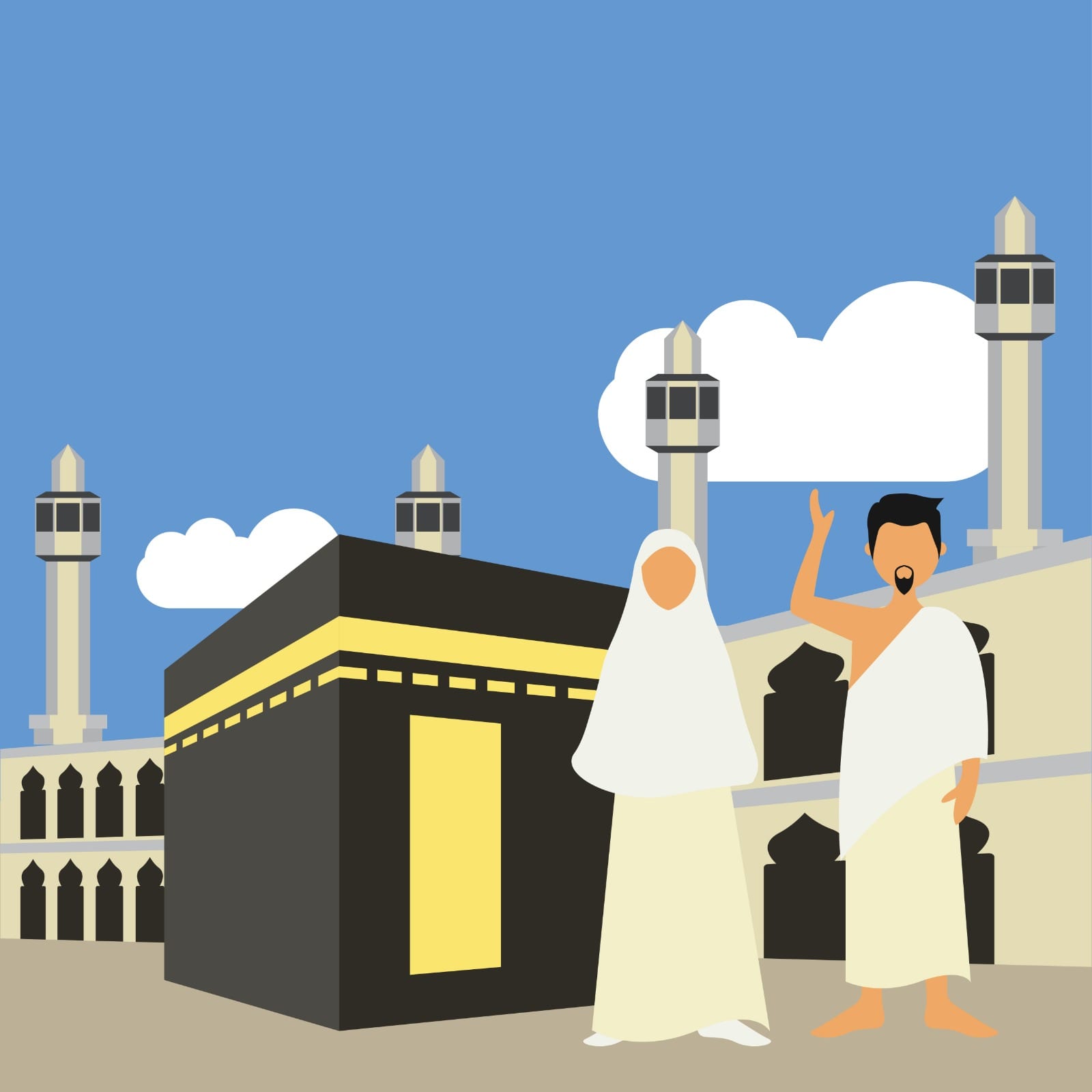By Editorial Staff
After setting off to Makkah (Mecca), the pilgrim carries out the first rite of pilgrimage, namely, ihram, which is a state of ritual consecration. There are certain places just outside Makkah called the miqats (entry stations to the Hajj or ‘Umrah), where the pilgrim must not exceed without being in a state of Ihram. You can take a ritual bath there and put on the ihram (the special plain clothing worn by Muslims on pilgrimage). In case it is not easy to do that at the miqat because you are travelling by plane, you can do that at home or before boarding the plane. The next step which must be done at the miqat is to make the intention for Hajj or ‘Umrah and begin reciting the Talbiyah.

Here I am at Your service, O Allah, here I am at your service! Here I am at your service! You have no partner. Here I am at your service. All praise and blessings belong to you. All dominion is yours and You have no partner.
Once you have done this, you have to observe the regulations of Ihram.
Prohibited acts during ihram:
1. Men may not wear clothes with stitching or anything else made exactly to fit a part of the body
This includes trousers (except in case of necessity), shirts, socks, gloves, etc. The male pilgrims are also prohibited to cover their heads with anything that touches the head such as turbans, hats, caps, etc.
Ibn ‘Umar (RAA) narrated, ‘The Messenger of Allah (ﷺ) was asked about what the person who is in a state of Ihram (Muhrim) should wear. He answered, “A person in the state of Ihram is not allowed to wear a sewn shirt, a turban, trousers, a hooded cloak, shoes or sewn slippers (Khuff), unless one is unable to find unsewn slippers, then he may wear his Khuff or shoes provided one cuts them below the ankles, and you must not wear clothing that has been dyed with sweet smelling fragrance (such as saffron and wars (a dye plant)).” (Al-Bukhari and Muslim)
In case one forgets to buy the ihram clothing and he is on a plane, he can take off his clothes except for the trousers. He can get one when he arrives at Makkah.
Narrated Ibn `Abbas:
The Prophet (ﷺ) said, “Whoever cannot get an Izar (the lower garment) can wear trousers, and whoever cannot wear sandals can wear Khuffs (socks made from thick fabric or leather).” (Al-Bukhari and Muslim)
As for women in a state of ihram, they must wear the clothes that covers the body except for the face and hands. Narrated Abdullah ibn ‘Umar:
The Ptophet (peace and blessings of Allah be upon him) said, “A woman in the state of Ihram may not wear a niqab or gloves.” (Al-Bukhari)
However, they are allowed to cover their face especially in presence of men. Narrated Aisha, Ummul Mu’minin:
Riders would pass us when we accompanied the Messenger of Allah (ﷺ) while we were in the sacred state (wearing ihram). When they came by us, one of us would let down her outer garment from her head over her face, and when they had passed on, we would uncover our faces. (Imam Ahmad and Abu Dawud)
Although this chain of narration of this hadith is not authentic, there is another narration related by ‘A’ishah (may Allah be pleased with her) that supports this hadith to become authentic.
2. Putting on perfumes
After taking a bath, the pilgrim is recommended to put on perfume provided that this is done before making the intention or reciting the Talbiyah. Once a person has recited the Talbiyah, they may not put on perfumes any more. Although washing the head or taking a bath is allowed, using scented soap is not. ‘A’ishah (may Allah be pleased with her) reported:
“I used to scent Allah’s Messenger (PBUH) whenever he wanted to assume ihram and (also) on finishing ihram before circumambulating the House of Allah (i.e. before tawaf). (Al-Bukhari and Muslim)
In another hadith related by Al-Bukhary and Muslim, The Prophet (peace and blessings of Allah be upon him) commanded a man who was scented with perfume while in a state of ihram to wash the perfume off his body thrice. To reconcile these apparently contradictory hadiths, scholars interpret the perfume in the latter hadith to be of certain kinds called saffron and wars (a dye plant)
3. Marriage, proposals and marital relations
A person in a state of ihram is not allowed to marry, propose, have sexual intercourse, touch his or her spouse lustfully or speak about these things. Allah says,
The (time-frame of the) Hajj-Pilgrimage falls within the well-known months (at the end of the lunar year). So whoever determines to undertake the Hajj-Pilgrimage therein, then there shall be no sexual relations (rafath), nor ungodliness, nor disputation, during the Hajj-Pilgrimage. (Quran 2:197)
The word “rafath” here is general enough to include sexual relations and what leads to it such as fondling or kissing.
‘Uthman bin ’Affan (RAA) narrated that the Messenger of Allah (ﷺ) said:
“A Muhrim (one in the state of Ihram) must neither marry himself, nor arrange the marriage of another one, nor should he make the proposal of marriage. (Muslim)
4. Using swear words and disputations
According to the above mentioned verse of the Quran, the pilgrim should not use swear words, fight or does anything that may be described as ungodly. Moreover, disputation is also not allowed except in cases of enjoining what is right and forbidding what is evil. However, this should also be done gently, wisely and with good admonition. Arguing with others for the sake of teaching them is also encouraged provided that this is done gently.
5. Shaving or cutting one’s nails
The pilgrim may not shave or remove hair from the head or the body without a legal excuse. The same legal ruling applies to cutting one’s fingernails or toenails. Allah says,
Yet you shall not (ritually) shave your heads until the charitable-offering reaches its destination (for sacrifice). As to whoever among you becomes sick, or has an ailment of the head (that requires shaving,) then the due redemption is fasting, or (giving) charity, or a (charitable-offering of) sacrifice. (Quran 2:196)
The following hadith of the Prophet (peace and blessings of Allah be upon him) further explains this verse of the Quran. Ka’b b. ‘Ujra (Allah be pleased with him) reported that the Messenger of Allah (may peace be, upon him) stood near him and lice were falling from his head. Thereupon he (the Holy Prophet) said:
Do these vermins trouble you? I said: Yes. Thereupon he said: Then shave your head; and it was in connection with me that this verse was revealed:
“As to whoever among you becomes sick, or has an ailment of the head (that requires shaving,) then the due redemption is fasting, or (giving) charity, or a (charitable-offering of) sacrifice.” (Quran 2:196)
He (the Holy Prophet, therefore) said to me: Observe fast for three days or give a quantity of alms enough to feed six needy persons or offer sacrifice (of an animal) that is available. (Muslim)
6. Killing or hunting anything
The person in a state of ihram may not hunt or help anyone who is hunting. Allah says,
O you who believe! Do not kill any game while you are in (the state of) pilgrim sanctity. And whoever among you kills any (game therein) deliberately, then the recompense (for him) shall be the like of what he has killed in (a charitable sacrifice of) cattle as two just men from among you shall so judge. It shall be (treated as) a charitable-offering (of sacrifice to God) brought to the Ka’bah (for the poor). Or, in atonement, (one shall offer its value in) food for the indigent (of the Sacred Precincts); or (one shall) render the equivalent of this (measure) in fasting so that he may taste the grievous consequences of his action. God has pardoned (of this) what has already passed. Yet whoever (willfully) repeats this (violation), then God will take vengeance on him. And God is overpowering, all-avenging (of evildoing). (Quran 5:95)
This state of Ihram continues till the pilgrim who performs hajj tamattu’ (performs the ‘Umrah separately before the Hajj) finishes the rites of the ‘Umrah. On the other hand, the person who is performing only the Hajj (ifrad) or combining the Hajj with the ‘Umrah (qiran) remains in the state of ihram till the 10th day of Dhul-hijjah.
Source
